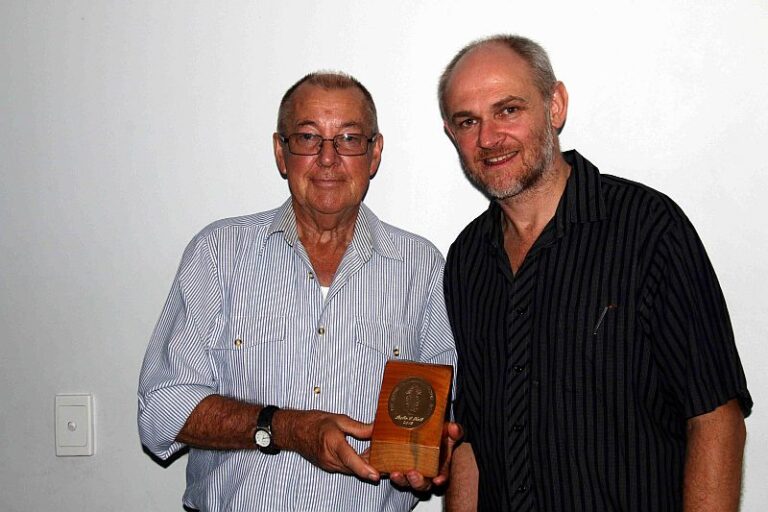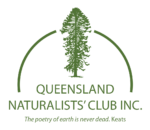
Queensland Natural History Award 2015 – Leslie S. Hall
The Queensland Natural History Award is presented annually by the Queensland Naturalists’ Club Inc. to give recognition to persons who have made outstanding contributions to natural history in Queensland. The Queensland Natural History Award for 2015 was presented to Leslie S. Hall by our president Harry Hines.
Les Hall was born in Lismore, NSW and began caving with the New South Wales Speleological Society in 1960 which started his interest in bats. He was employed by CSIRO Division of Wildlife Research and a visit to caves on the Nullarbor Plain led a lifetime study of bats. He began Bat Banding in 1962 and has supervised a number of banding operations for research projects
In 1974 he joined the University of Queensland, in the Department of Anatomy and later the Department of Veterinary Anatomy. This gave him the opportunity to further his interest in bats (and other native mammals) and he gained his PhD in 1988 with a thesis on bandicoots. He has published over 200 journal articles; many of the papers are anatomical in nature, reflecting his early research and teaching activities with chapters on the early development of marsupials in four books and the first papers describing the embryology and early development of the Platypus and the early growth of the Echidna.
However, most of his publications are concerned with the biology, behaviour and ecology of bats: he authored three family accounts in the Fauna of Australia; seven species accounts for The Mammals of Australia and 13 for the later 3rd Edition of this book, and many journal articles.
In addition to his scientific papers, Les has written many popular articles in journals such as Australian Geographic, Australian Natural History, BBC Wildlife, Geo, Nature Australia, Wildlife Australia. He wrote the chapter on “Bats” in the Wildlife of Greater Brisbane, and co-authored the “Bats” in Wildlife of Tropical North Queensland . He has written four books which have all been very popular and successful. His book Bats. A Wild Australia Guide, (2009) won a prestigious Whitley Commendation in 2010.
Les has made significant contributions to many professional and amateur organisations during his career. These include The Queensland Ornithological Society, the Australian Mammal Society, The Australasian Bat Society. . He is a member of the IUCN Chiropteran Specialist Group and is an advisor for Bat Conservation International. He is on the editorial boards of three journals. Much of this was done in his private time, outside of professional working hours. In recent years he has developed a strong relationship with the University of Malaysia, Sarawak to further knowledge of bats, wildlife and conservation in general. After retirement he has developed a strong involvement with environmental community groups in Maleny.
Les has always been very generous by giving expert advice to many community and conservation groups. He has given innumerable talks to community groups free of charge. He has also made available his excellent photographs of bats, and other subjects, free of charge to many authors. For example, many of the bat photographs in the Queensland Museum’s “Wildlife of Greater Brisbane” are from his donations.
Les Hall was an enthusiastic and popular teacher in his professional career. He has successfully supervised 27 postgraduate students and many of these have gone on to achieve significant roles in biology and conservation. Through his own research and that of his postgraduate students, Les has greatly increased our scientific knowledge of bats. His research on flying foxes has enabled him to provide scientific facts to counter some of the widespread misinformation on this group of animals. He has disseminated this information through talks, radio interviews, popular articles, books and as an expert witness in court cases.
He is acknowledged as being one of the top bat experts in Australia with a comprehensive knowledge of many aspects of their biology from anatomy to behavior and conservation. Beyond this, however, his popular books and talks to public groups have spread this information to a much wider audience.
